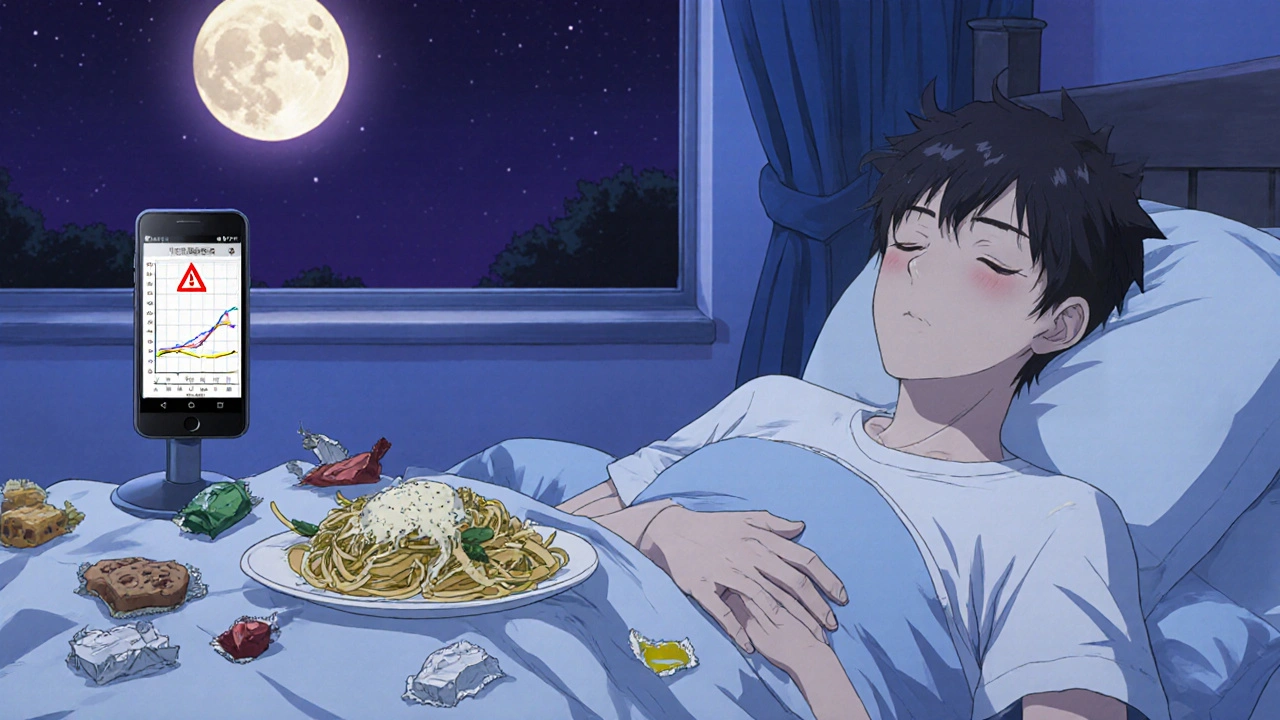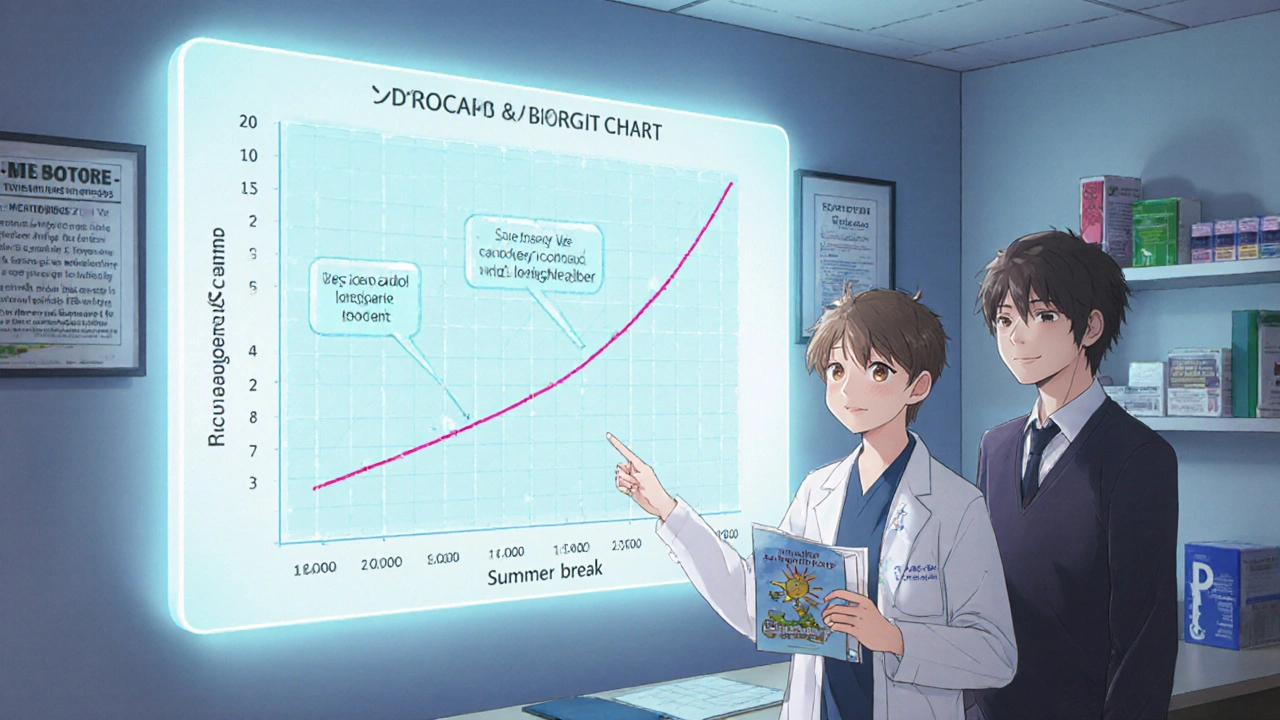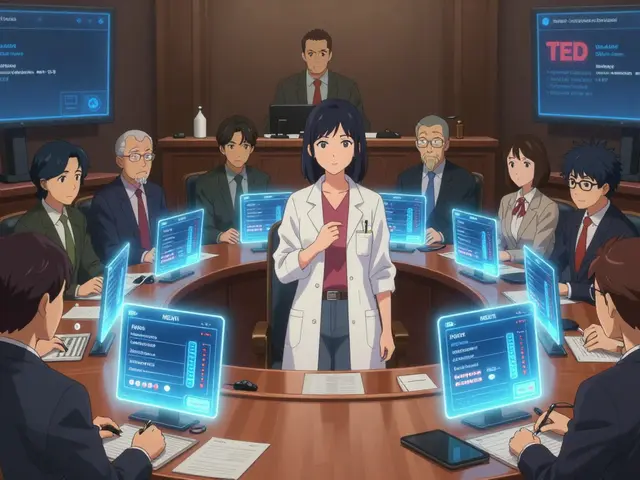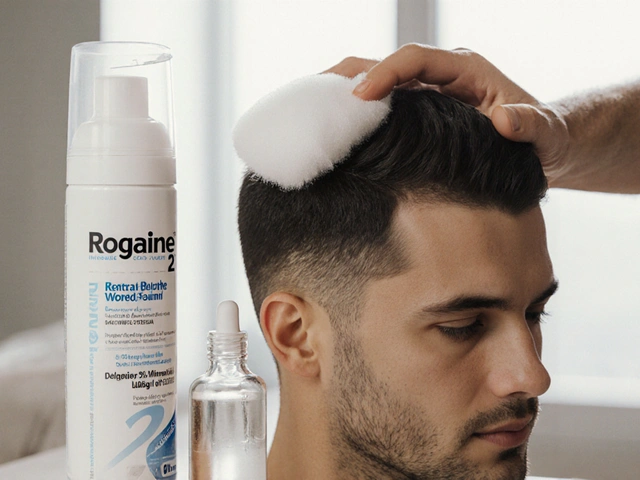ADHD Medication Growth Monitor
Follow these steps: 1. Measure height/weight monthly using a wall-mounted tape measure and digital scale. 2. Input the latest values. 3. Compare results against pediatric growth standards.
When to worry: - Height z-score drop > 0.5 - Weight z-score drop > 1.0 - Weight loss > 10% body weight
Results
When teens start taking ADHD medication, parents often see quick improvements-better focus in class, fewer outbursts, homework gets done. But beneath those wins, there’s a quieter concern: growth, appetite, and the slow build-up of side effects that don’t show up in a single doctor’s visit. These aren’t rare issues. They’re common, predictable, and manageable-if you know what to watch for.
How ADHD Medications Work and Why They Affect Growth
Stimulant medications like methylphenidate (Ritalin, Concerta) and amphetamines (Adderall, Vyvanse) boost dopamine and norepinephrine in the brain. That’s what helps teens stay focused and control impulses. But these same chemicals also affect the body’s hunger signals and growth hormones. The result? Many teens on these meds eat less, gain less weight, and grow slower than their peers. Studies show that after two to three years of continuous use, teens may end up about 0.5 to 1 inch shorter than they would have been without medication. That’s not a dramatic difference, but for a teenager already struggling with self-image or already on the lower end of the height chart, it matters. The biggest impact happens in the first year-when the body is still adjusting. After that, growth tends to slow but doesn’t stop entirely. Not all meds affect growth the same way. Amphetamine-based drugs like Vyvanse and Adderall tend to suppress growth slightly more than methylphenidate-based ones like Concerta. A 2019 meta-analysis found teens on amphetamines lost about 1.7 cm in height over three years, while those on methylphenidate lost around 1.1 cm. Non-stimulants like Strattera don’t seem to affect growth at all-but they’re also less effective for core ADHD symptoms, working for only about 60% of teens compared to 70-80% for stimulants.Appetite Loss: The Silent Hunger Crisis
One of the most immediate side effects is appetite loss. Up to 80% of teens on stimulants report feeling less hungry, especially during school hours. That’s not just about skipping snacks. It’s about missing entire meals. A 2023 survey of parents on ADDitude Magazine’s forum showed that 68% of teens on ADHD meds ate less than 300 calories during the school day. One parent shared: “My son eats one granola bar at lunch. Then when the medication wears off after 5 PM, he’s ravenous-eating enough for three people.” That pattern-skipping calories during the day, overeating at night-isn’t healthy. It disrupts blood sugar, sleep, and long-term nutrition. Weight loss is a real risk. In a 2022 CHADD survey, 19% of parents reported their child lost more than 10% of their body weight on stimulants. One teen dropped from the 50th to the 15th percentile in weight within eight months. That’s not normal. It’s a red flag.When to Worry: Growth and Weight Monitoring
The American Academy of Pediatrics says this: Measure height and weight every three months during the first year of treatment, then every six months after that. That’s not optional. It’s standard care. Doctors track growth using z-scores-statistical measures that show how far a child’s height or weight falls from the average for their age and sex. If a teen’s height z-score drops by more than 0.5, or weight z-score by more than 1.0 within six months, it’s time to act. That’s the threshold most pediatricians use to decide whether to adjust the dose, change the medication, or take a break. Many clinics now use digital growth charts that auto-flag concerning trends. In 2021, 92% of pediatric practices had adopted this tech. That means your doctor should be seeing patterns before you even notice them.
Practical Strategies to Protect Growth and Nutrition
You don’t have to choose between focus and growth. There are real, working solutions:- Front-load calories. Serve a high-calorie, protein-rich breakfast before the medication kicks in-think scrambled eggs with cheese, peanut butter on whole grain toast, or a smoothie with banana, oats, and almond butter. If the med starts working at 8 AM, eat by 7 AM.
- Snack smart. Keep calorie-dense snacks on hand: trail mix, cheese sticks, whole milk yogurt, avocado slices. Avoid sugary snacks-they cause crashes that make appetite worse.
- Make dinner count. When the med wears off, the body craves energy. Don’t let dinner be an afterthought. Add olive oil to veggies, full-fat dairy, nut butters, and lean meats. A 2023 study found teens who ate nutrient-dense evening meals maintained better weight than those who ate fast food after school.
- Consider a medication holiday. Many pediatricians recommend a break during summer or winter break. A 2020 study found 73% of psychiatrists supported this. Growth velocity often rebounds quickly-87% of teens in one study caught up 75% of their lost growth within six months of stopping meds.
What the Long-Term Data Really Shows
The biggest fear? “Will my child be shorter for life?” The answer, based on the latest follow-up data from the MTA study (published January 2023), is reassuring: 89% of teens who experienced growth suppression during treatment caught up to their genetic height potential by age 25. Only 11% had a persistent height deficit of more than 1.5 cm. That’s not a guarantee for every teen-but it’s strong evidence that the body has a way of recovering, especially if medication is paused during key growth periods. A 2017 study even found no significant difference in adult height between teens who took ADHD meds and those who didn’t. So while short-term suppression is real, long-term impact is often minimal.
When to Switch Medications or Try Non-Stimulants
If your teen is losing weight, falling off their growth curve, or showing signs of chronic fatigue and irritability, it’s time to talk about alternatives. Non-stimulants like atomoxetine (Strattera), guanfacine (Intuniv), or clonidine (Kapvay) don’t suppress appetite or growth. But they’re not magic bullets. They take weeks to work. They’re less effective for hyperactivity. And they can cause drowsiness or dizziness. Still, for some families, the trade-off is worth it. In 2022, non-stimulants made up 18% of adolescent ADHD prescriptions-up from 12% in 2018. That shift is driven by parents and doctors who’ve seen the toll stimulants take on growth and eating habits. Newer formulations like Adhansia XR, approved by the FDA in 2023, were designed to reduce appetite suppression. In clinical trials, users lost 18% less weight than those on older amphetamine versions. That’s a small win-but for a teen struggling to eat, it matters.What You Can Do Today
- Track your teen’s height and weight monthly. Use a home scale and tape measure. Write it down. Don’t wait for the next doctor’s visit. - Plan meals around medication timing. Breakfast before meds. Dinner after. Snacks in between. - Ask about growth charts. If your doctor isn’t showing you the z-scores, ask for them. - Don’t assume appetite loss is “just part of it.” If your teen is losing weight or refusing meals, speak up. There are options. - Consider a summer break. Talk to your doctor about a 4-6 week pause during school breaks. Many teens bounce back quickly. The goal isn’t to avoid medication. It’s to use it wisely. ADHD meds change lives-for the better. But they shouldn’t steal a child’s growth, their hunger, or their future health. With careful monitoring and smart adjustments, you can have both: focus and growth.Do ADHD medications permanently stunt growth?
No, most teens catch up to their expected height by their mid-20s. Long-term studies show that only about 11% of teens on stimulants have a persistent height reduction of more than 1.5 cm. Growth suppression is usually temporary and linked to the first 1-2 years of treatment. Taking planned breaks from medication often helps the body recover lost growth velocity.
How soon do appetite side effects start?
Appetite suppression often begins within the first week of starting or increasing a stimulant dose. It’s most noticeable during school hours when the medication is at peak levels. Many teens skip lunch or eat very little between breakfast and after-school snack time. The effect usually stabilizes after 4-6 weeks, but doesn’t always go away completely.
Should I stop ADHD meds if my teen is losing weight?
Not necessarily-but you should act. If your teen loses more than 10% of their body weight or drops two or more percentiles on the growth chart, talk to your doctor. Before stopping meds, try adjusting meal timing, adding calorie-dense snacks, or lowering the dose. In severe cases, switching to a non-stimulant or adding an appetite stimulant like cyproheptadine may be better than quitting entirely.
Are non-stimulant ADHD meds better for growth?
Yes. Non-stimulants like Strattera, Intuniv, and Kapvay don’t suppress appetite or slow growth. But they’re less effective for core ADHD symptoms-helping about 60% of teens compared to 70-80% for stimulants. They also take longer to work (weeks, not days) and can cause drowsiness or dizziness. The trade-off is worth it for some families, especially if growth or nutrition is a major concern.
What’s the best way to monitor growth at home?
Measure height every month using a wall-mounted tape measure-stand barefoot with heels against the wall, head level. Record weight weekly on a digital scale. Track changes over time. A drop of more than 0.5 cm in height or 1 kg in weight over a month is worth noting. Share this data with your doctor at every visit. Many pediatricians now use digital growth charts that flag trends automatically.
Can diet changes really offset appetite loss from ADHD meds?
Yes, if done strategically. Eating high-calorie, nutrient-dense meals before the medication kicks in (like at 7 AM for an 8 AM dose) helps. Adding healthy fats-avocado, nuts, cheese, olive oil-boosts calorie intake without increasing volume. Smoothies with protein powder, whole milk, and peanut butter can add 500+ calories in one drink. Snacks like trail mix, Greek yogurt with granola, and whole-grain toast with nut butter work better than chips or candy. Many families report success by focusing on evening meals when the medication wears off.





As a mother of two teens on stimulants, I’ve seen the appetite loss firsthand-my daughter used to eat like a wolf after school, now she stares at her plate like it’s a foreign object. But we fixed it by front-loading: breakfast is a protein smoothie with peanut butter, banana, oats, and whole milk. She eats like a normal human again. It’s not magic, just timing.
Oh please. You’re all treating this like some tragic Shakespearean tragedy. Teens on ADHD meds lose a fraction of an inch? Big. Damn. Deal. The alternative is a kid who can’t finish a sentence, flunks out of college, and ends up on disability. Growth is a luxury. Focus is survival. Stop anthropomorphizing neurochemistry.
my kid started on vyvanse last year and honestly i didnt even notice the weight thing until he started fitting into his old jeans again like he was 12 again and then i panicked and looked up the studies and holy crap turns out its a thing and i feel like an idiot for not checking the growth chart sooner but now we do monthly measurements and its like a little ritual we do on sunday nights with a tape measure and a snack bar and yeah its weird but its working
Let’s be honest-the CDC and pharma are quietly pushing this narrative because they don’t want parents questioning stimulant use. The real data? It’s buried in obscure journals. The 89% catch-up statistic? That’s cherry-picked. What about the 11% who never recover? Are they just collateral damage in the ADHD industrial complex? Wake up.
Good post. Practical advice matters more than fear. I’m a school nurse and I’ve seen kids go from barely eating lunch to thriving because their parents started offering cheese sticks, hard-boiled eggs, and peanut butter packets in their backpacks. Small changes. Huge impact. Don’t let perfectionism stop you from doing something good.
Western medicine is obsessed with quantifying everything-z-scores, percentiles, calorie counts-but no one asks what the child feels. Is he happy? Is he lonely? Does he feel like a lab rat with a pill schedule? India has been treating ADHD with yoga, Ayurveda, and mindfulness for centuries without a single growth chart. Maybe we’re measuring the wrong things.
Grow up. If your kid is too skinny because he’s finally paying attention in class then good. I was a hyper mess at 15 and my parents didn’t give a crap about my weight. I turned out fine. Stop coddling. Medication isn’t the enemy-weak parenting is.
It’s not about growth. It’s about control. We medicate kids to make them fit into a system that doesn’t fit them. The real question isn’t how much they grow-it’s why we expect them to sit still for six hours a day in the first place.
I appreciate how this post balances science with compassion. In my community, many families avoid meds because they fear side effects-but they also don’t know how to manage them. This is the kind of clear, calm guidance that helps people make informed choices without shame. Thank you.
Anyone who says growth suppression is 'manageable' hasn't seen their child cry because they're the shortest in class again. You talk about 'smart adjustments' like it's a spreadsheet. It's a child's body. It's a child's dignity. This isn't optimization-it's erasure.
My son’s been on Concerta for two years. We started tracking his height and weight every month-just like the article said-and we caught a dip early. We switched to a lower dose and added a bedtime smoothie with whole milk and almond butter. He’s back on track. He’s also doing better in math. It’s not perfect-but it’s working. And we’re not giving up.
Wow so you’re telling me if I give my kid a peanut butter sandwich before school he won’t turn into a stick figure? Newsflash: I didn’t know I was supposed to be a nutritionist AND a psychiatrist. Why isn’t the school feeding them? Why is this my job? This is ridiculous.
I’ve been a pediatric nurse for 18 years. I’ve seen kids on stimulants who thrive-and kids who vanish into themselves. The ones who survive? The ones whose families treat them like people, not patients. Mealtime isn’t a chore-it’s connection. Talk to them. Listen. The data matters. But so does the silence between the words.
the fact that we even have to worry about this says everything about how broken our system is. we medicate kids to fit into a school model designed for the 1950s and then act shocked when their bodies rebel. maybe the problem isn't the medicine. maybe it's the cage.
Does anyone know if there’s data on how non-stimulants affect executive function long-term? I get the growth thing, but my kid’s focus is still all over the place on Strattera. Is it just me, or are we trading one problem for another without clear trade-off metrics?